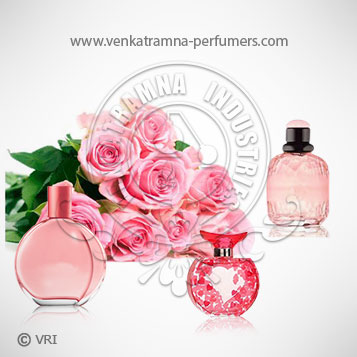
| Botanical Name | Rosa damascena |
| Common Name | Rose |
| Country of Origin | Bulgaria, |
| Solubility | Alcohol soluble |
| Specific Gravity | 1.130–1.35 @ 20°C |
| Optical Rotation | -14.0 – -5.0 @ 20°C |
| Refrective Index | 1.522–1.590 @ 20°C |
| PlantPart | Flowers |
| Bland With | N/A |
| CAS No | 8006-90-4 |
| Flash Point | 102°C (215.6°F) |
| Extraction Method | Solvent extracted |
Our floral waters are extremely versatile. They can be added to your creams and lotions instead of water, or alternatively employed as an aromatic face or body spritz. They are an excellent linen spray and a simple way for the novice aromatherapist to enjoy the therapeutic benefits of essential oils. Add to a soothing hot bath.
No other flower has inspired as much poetry, lyrics, love or longing, and no other flower expresses them better. Rose worship flourished 5000 years ago and it never much let up. Her scent is a feminine fragrance par excellence, sensual and erotic, yet assertive. If one reads the old herbals one might think that a whole system of medicine could be devised entirely based on the virtues of Roses: Rose tea, rose water, rose oil, rose wine, rose pomander, rose pastilles; the list goes on. Rose oil has always been a favourite, though expensive cosmetics item, and rosewater, a by-product of essential oil production, is equally cherished. Since 'still rooms' have become a thing of the past, such luxurious, yet simple natural treats have sunk into oblivion, making way for the advance of chemical replacements. Yet, even the cosmetics industry cannot do without roses. Although chemists have tried to manufacture an 'aroma-identical' synthetic rose oil, no-one has yet managed to reproduce the real thing. Thus huge quantities of roses are still grown solely for essential oil production, most of which is consumed by the perfume and cosmetics industry. Unfortunately, as with all expensive oils, Rose oil is frequently subject to adulteration. Cheaper essential oils or even perfume oils are often used to stretch the product and the profit margin. In mythology, Roses are sacred to Venus and depending on the eye of the observer, signify love, beauty, purity and innocence or passion and eroticism. Rose has the ability to somehow merge all these paradoxical aspects of femininity into its simple yet complex nature. Her many silken petals are like the veils that shroud the female mysteries.
Color : Yellow to orange liquid ,
Aroma : Spicy floral and very deep rose odor
Phenyl-ethyl alcohol from 45.0 to 71.0 Citronelol from 6.0 to 12.0 Geraniol from 2.5 to 7.5 Nerol from 1.5 to 6.5 Evgenol from 0.9 to 2.2 Ethyl alcohol up to 2.0 Methyl evgenol from 0.3 to 0.8
Rose are synonymous with love and sacred to Venus/Aphrodite. The oil can be used in all rites of love, for love spells or for amulets to attract a lover. It can also be used to heal a broken heart and overcome disappointment. Venus/Aphrodite, Goddess of Love, presides over all matters of the heart, and the Rose, as her most sacred herb, acts as her messenger. Rose oil is ideal for getting in touch with the source of feminine power within and serves well at all stages of initiation into the female mysteries. It may also be used in fertility rites and to call or welcome new souls into our world. Rose may be used to study the higher levels of alchymical mysteries and to manifest abundance